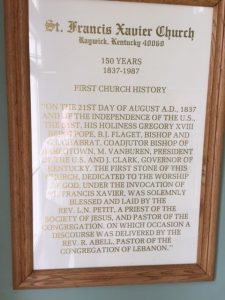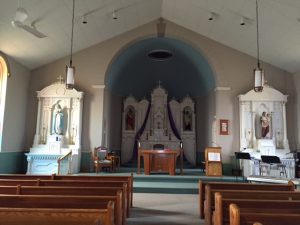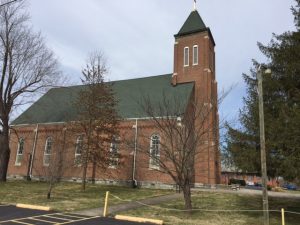One of the little known people who helped to bring the Catholic Faith to Indiana was a Jesuit named Louis Nicholas Petit. We mention him today becasue today is the anniversary of the founding of one of Fr. Petit’s churches, Saint Francis Xavier, in Raywick Kentucky.
The parish which was founded by Fr. Petit was named, of course, after the famous Jesuit missionary, but perhaps too, it was his way of honoring the people he served in Vincennes at St. Francis Xavier Cathedral.
The parish published a short history some time ago. Here is a portion of it:
St Francis Xavier Catholic Church has served the small, rural community of Raywick, Kentucky for over 170 years. It has stood the test of time with the deep faith and countless contributions of parishsioners, clergy and the sisters of neighboring communities. As plan the future of our church it is important to understand the rich history that has laid the foundation for the present. The land where the parish is now located was an expanse of woods wild animals visited by various bands of native American Indians. The Catholic emigrants form Maryland, a sturdy stock of men and women, established themselves along rivers and creeks to have access to These were a faithful people who kept their faith. Bishop B.J. Flaget authorized establishment of the church in 1834. It was not until three years later that Rev. L.N. Petit began the parish and named it St Francis Xavier after a great Jesuit saint. The first stone layed on the 21st day of August 1837 with the original document being placed in the cornerstone. The building was completed in 1840, but the parish had outgrown its worship space in just 50 years. This led to construction of the second church in 1887, which is still used. When the Jesuits left the diocese in 1837, Diocesan Priest and the Resurrectionists served the parish. Numerous contributions have been made through the educational and spiritual work of the Sisters of Loretto, the Sisters of Charity of Nazareth and the Ursuline Sisters from Mount St. Joseph.
Benedict Joseph Webb, in his book “The Centenary of Catholicity in Kentucky” gives us a small biography of this faithful servant.
Rev. Nicholas Petit was born on the island of Hayti on the 8th of July, 1789. His father was a rich Creole planter, originally from Lyons, France, and he lost his life in the general massacre of the French by the negroes of the island, in 1793. His mother fled the country with her children and went to Baltimore, where, having lost everything in the catastrophe that had deprived her of a husband, she was content, in order to gain a livelihood, to open and conduct a boarding school for young ladies. Nicholas attended the schools of the Sulpician fathers, and as the family remained in Baltimore for nine years, the lad became in time just as proficient in the use of the English language as any of his playmates or school companions. He was twelve years of age when his mother determined to return to France; and, his after education being prosecuted in the mother country, in a very short time he had forgotten all that he had previously learned of the spoken language of the United States. He was educated for the holy ministry in France, and was there ordained priest. He became a member of the Society of Jesus on the 15th of January, 1816, about six months after the re-establishment of the order by Pius VII; and he labored for many years in the fruitful missions by which piety and faith in France were so greatly advanced after the restoration of the Bour bons. When, in company with Father Chazelle in 1830, he reached the United States, he supposed it would be necessary for him to begin again the study of the English language, but he found, even before he had reached Bardstown, that his knowledge of the idiom was not dead, but had only slept. For the reason, possibly, that he had much experience as a missionary priest, Father Petit was given charge of the church of St. Charles, near the college, a position which he retained while the Jesuits remained in Kentucky. He also paid periodical visits to the Catholics residing in and around the town of Raywick, in Marion county, for whom, in 1839, he succeeded in building the present church of St. Francis Xavier. He was among the last of his brethren to leave Kentucky. He afterwards labored in the houses of the order in New York with much zeal and fidelity, and his death took place in Troy, N.Y., on the 1st day of February, 1855.” [Webb, Benedict Joseph, 1814-1897. The Centenary of Catholicity In Kentucky. Louisville [Ky.]: C. A. Rogers, 1884.]
Fr. Petit was in service to the Diocese of Barsdtown, but until 1834, when the Diocese of Vincennes was formed, priests from Kentucky would wander into Indiana and in particular the area now known as Washington Indiana, etc. They also attended to Vincennes, of course. In fact, Fr. Petit S.J. and Fr. Simon Lalumiere were serving Vincennes in 1833.
When Simon Brute was named Bishop of Vincennes, he made his way to St. Louis where he was consecrated. Accompanying him were Bishops Purcell and Flaget as well as Fr. Petit. After Brute settled in Vincennes, Petit stayed for a short time before returning to Kentucky.
Petit apparently made an impression on Brute becasue in a few short years Brute was asking the Superior General of the Jesuits as well as Rome to name Petit as his Coadjutor bishop. Of course that never happened. Gilbert Garraghan, in his Jesuits of the Middle United States wrote:
Bishop Brute of Vincennes made repeated efforts to obtain a Jesuit for his coadjutor, having proposed to Rome in this connection the name of Father Nicholas Petit of St. Mary’s College, Kentucky. “I give up,” he wrote to Father Roothaan, “my prolonged and useless efforts to obtain a coadjutor from your Society.”
Garraghan adds this footnote:
Brute to Roothaan, May 28, 1839. (AA). Bishop Rosati, in seconding Brutés petition to have Father Petit for his coadjutor, had written as follows to Propaganda: “Reverend Father Louis [Nicholas] Petit, who is mentioned first, I consider worthiest to be chosen,in preference to the others for the office of coadjutor-bishop of the Bishop of Vincennes; for he excels in piety, learning, eloquence, knowledge of the English and French languages, as also in administrative ability. To all the faithful of that same diocese, to whom he is by no means unknown, having conducted missions among them, he would beyond doubt be highly acceptable. Besides, that he has professed the religious life in the Society of Jesus, that he is of the utmost utility and even necessity to the Kentucky Mission of the Society of Jesus, in which he is now living, that the rules of the Society do not allow of the promotion of its members to the episcopate, these circumstances, so your Eminence will judge, do not in any manner stand in the way of his election. [Garraghan, Gilbert J. 1938. The Jesuits of the middle United States. New York: America Press. p.118]
This is just a short essay about Fr. Petit and his service to the Church in Indiana (and Kentucky). It is to remember not only his service to the Church in Indiana, but also his work in our Mother Diocese — Bardstown. Here are some recent photos of St. Francis Xavier in Raywick Kentucky as well as Fr. Petit’s grave in Troy, New York.



